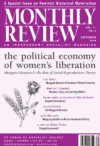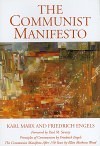Marxism

Monthly Review and Monthly Review Press author, world socialist activist, and theorist of revolution, Marta Harnecker, died on June 15, 2019, at age 82. In her memory, we republish an exchange between her and Greek journalist Tassos Tsakiroglou, conducted in advance of the 2017 conference on 150 Years of Marx’s Capital: Reflections for the Twenty-First Century. | more…

This special issue of Monthly Review honors the fiftieth anniversary this month of Margaret Benston’s landmark “The Political Economy of Women’s Liberation.” The essay sparked a revolution in Marxian thought, the full implications of which are only now being perceived in contemporary social reproduction theory. We have reprinted Benson’s pieces together with contributions by Silvia Federici, Martha E. Gimenez, Selma James (interviewed by Ron Augustin), Leith Mullings, Marge Piercy, and Lise Vogel, all of whom have played leading roles since the 1970s in the development of feminist historical materialism. | more…
 [PDF]-100x146.jpg)
In sheer quantity, household labor, including child care, constitutes a huge amount of socially necessary production. Nevertheless, in a society based on commodity production, it is not usually considered “real work” since it is outside of trade and the market place. This assignment of household work as the function of a special category women means that this group does stand in a different relation to production than the group men. Except for the very rich, who can hire someone to do it, there is for most women, an irreducible minimum of necessary labor involved in caring for home, husband, and children. Household work remains a matter of private production. | more…

Margaret Benston and the Political Economy of Women's Liberation
In the late 1960s, the North American women’s liberation movement was reaching a highpoint of activity, its militancy complemented by a flourishing literature. This was the environment into which Margaret Benston’s 1969 Monthly Review essay, “The Political Economy of Women’s Liberation,” struck like a lightning bolt. At the time, many in the movement were describing women’s situation in terms of sociological roles, functions, and structures—reproduction, socialization, psychology, sexuality, and the like. In contrast, Benston proposed an analysis in Marxist terms of women’s unpaid labor in the family household. In this way, she definitively shifted the framework for discussion of women’s oppression onto the terrain of Marxist political economy. | more…

Reflections on Feminism and Its Future
The question of the oppression of women, the critique of which constituted feminism as an academic and political pursuit, has been feminism’s enduring source of strength and appeal, yielding numerous critical theories and perspectives. This has produced continual conceptual shifts defining an evolving feminism, such as the shift from women to gender and from inequality to difference. It has also involved shifts from theorizing the general conditions of women’s experience—oppressed at home and in the workplace, while juggling the conflicting demands of both—to theorizing the implications of the claim that, while gender may be the main source of oppression for white, heterosexual, middle-class women, women with different characteristics and experiences are affected by other forms of oppression as well. A possible way for Marxist feminism to remain a distinctive theoretical and politically relevant perspective might be to return to class, in the Marxist sense, theoretically reexamining the relationship between class and oppression, particularly the oppression of working-class women, within capitalist social formations. | more…

The Political Economy of Women's Liberation
Margaret Benston’s “The Political Economy of Women’s Liberation” appears as both a return to the past and, at the same time, if not a “watershed,” as described by Peter Custers, certainly a new turn. On the one hand, she reiterated the classic Marxist-Leninist argument concerning the precapitalist, premarket character of domestic work. On the other, she so strongly insisted on the importance of this work for the stability and perpetuation of the capitalist system that she not only anticipated some of the theses later argued by theorists in the Wages for Housework Campaign, but often fell into apparent contradictions. | more…

Gender is not just about women; it is about the social relationship between men and women and the dialectical, reciprocal, and cultural construction of femininity and masculinity. Recognition of a unique historical experience concerning gender informs the perspectives of African Americans of various political persuasions. This history incorporates a land of origin with certain common principles about gender and family. It also encompasses the African-American experience in the United States where the denial of many “protections” offered by gender roles and indeed sometimes inversion of such roles was a means of maintaining control. Hence asserting the right to assume gender-based roles of husband, father, wife, and mother paradoxically was an act of resistance. The manner in which African-American people have envisioned relationships of gender in light of that history has expressed itself in markedly different forms. | more…

In 1952, Selma James wrote the classic pamphlet A Woman’s Place and, in 1972, she and Mariarosa Dalla Costa published their groundbreaking The Power of Women and the Subversion of the Community, which discussed how women’s unpaid housework and care work is crucial to the production of the working class and, thus, the economy as a whole, launching the domestic labor debate inside the women’s movement. That same year, the International Wages for Housework Campaign was formed. In an interview with Ron Augustin at her home in London, James spoke of her political activities and years with C. L. R. James, whom she was with for more than twenty-five years, each with their own political activities but also sharing important struggles. | more…

This reprise of Harry Magdoff’s 1969 “A Note on the Communist Manifesto” remains as relevant as ever—perhaps even more so. While capitalism by its very nature lives by accumulation and geographic expansion, it does so in a most unequal fashion. Even though nothing in economics follows strict mathematical rules, there are notable tendencies produced by the inner springs of capitalism. An outstanding example of such a tendency is found in the distinct and marked widening of the gap between a handful of rich nations and the rest of the world. The accelerating globalization of our times demonstrates this polarization in no uncertain terms. | more…

Political scientist, author, and activist, Marta Harnecker has devoted her life to collaborating in building radical democracy in Latin American communities where people have, for generations, experienced crushing poverty and a near complete loss of control over their lives. In South America and the Caribbean, but especially in Cuba and Venezuela, Harnecker has worked directly with disenfranchised workers and peasants. From the ground up, she has helped to build new structures and methods that bring to virtually unknown towns and provinces the full meaning of the Bolivarian revolution. In this latest work, Harnecker, with Spanish economist José Bartolomé, shares some of her wisdom on how this is being done, and how communities everywhere can gain empowerment. | more…

For over a century, Karl Marx’s critique of capitalism has been a crucial resource for social movements. Now, recent economic crises have made it imperative for us to comprehend and actualize Marx’s ideas. But without a knowledge of Karl Marx’s life as he lived it, neither Marx nor his works can be fully understood. There are more than twenty-five comprehensive biographies of Marx, but none of them consider his life and work in equal, corresponding measure. This biography, planned for three volumes, aims to include what most biographies have reduced to mere background: the contemporary conflicts, struggles, and disputes that engaged Marx at the time of his writings, alongside his complex relationships with a varied assortment of friends and opponents. | more…

Situated largely within the Marxist debates on imperialism—but addressing the liberal formulations too—The Changing Face of Imperialism: Colonialism to Contemporary Capitalism is an important intervention regarding the material basis of imperialism and its three-hundred-year-old history of unequal power relations. The book broadly addresses five issues: (1) the nature of finance capital and the novel yet familiar processes of value extraction; (2) the world of capital; (3) global production networks and labor regimes; (4) the institutional system of nation-states in the new global order; and (5) the nature of integration from colonial regimes to now. | more…


 [PDF]-100x146.jpg)








